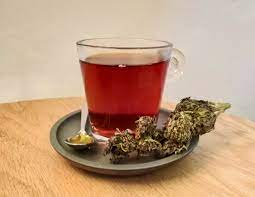Cannabis Tea
Cannabis Tea
Cannabis Tea. Deeply aromatic and invigorating, there’s a unique tea that’s been stirring interest. Though it originates from a plant that has often courted controversy, the focus here is not on the contentious, but on the fascinating and therapeutic properties of this beverage.
The Making of an Unconventional Brew
Creating this tea involves infusing the plant’s dried leaves or buds in hot water. Moreover, some choose to incorporate other herbs, spices, or even a little honey, thereby enhancing its flavor. This brew is a captivating blend of taste, fragrance, and potential health benefits.
Therapeutic Advantages
Indeed, there are possible health advantages to this tea. Primarily, it may help in pain management. Individuals suffering from chronic pain conditions have reportedly found some relief with regular, moderated intake. Nonetheless, it’s vital to consult a healthcare provider before incorporating it into any pain management strategy.
In addition to pain relief, the tea may have a calming effect. It can potentially help in managing anxiety and promoting better sleep, albeit research in this area is ongoing.
The Caffeine-Free Alternative
For those seeking a caffeine-free alternative to their daily cup of joe or regular tea, this might be a compelling option. It does not contain caffeine, thus avoiding the associated jitters or energy crashes. Furthermore, it provides a warming, comforting experience that many tea lovers cherish.
Responsible Consumption and Legal Considerations
However, there’s more to this tea than its soothing warmth and potential health benefits. It’s important to note that its consumption is subject to varying legal restrictions worldwide. Consequently, awareness of local regulations is essential.
Furthermore, as with any substance, responsible usage is crucial. Overconsumption could lead to unpleasant side effects. Hence, moderation is the key to enjoying this aromatic brew while reaping its potential benefits.
Delving into Research and Advocacy
More research is necessary to fully understand the therapeutic potential of this tea. Encouragingly, as scientific inquiry progresses, it will likely yield a clearer picture of its benefits and risks.
It’s also hoped that ongoing advocacy and education will foster a balanced perspective. This could help demystify the brew, shifting focus from its controversial reputation to its potential as a wellness product.
In conclusion, this tea, rich in aroma and potential health benefits, serves as an inviting alternative for tea enthusiasts. As understanding grows and perceptions shift, it may become an increasingly accepted part of our wellness routines. This brew, far from ordinary, invites us to rethink our preconceptions and explore new paths to wellbeing.
Click here to read similar articles.



Add Comment